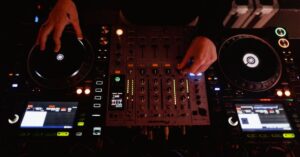8 ways to earn money as a music producer
Producing music can be a deeply rewarding hobby. While many people start without thinking about financial success, there often comes a time when it would be nice to earn some money from your art. After all, this hobby isn’t exactly cheap, and by the time you’ve reached a level where others might be willing to pay for your music, you’ve likely invested thousands of dollars into studio gear and resources. So, the question of how to make money as a music producer is more than valid. In this blog post, I’ll walk you through a few ways you can generate different income streams as a music producer, not only from your music but also from the knowledge and skills you’ve developed along the way.
DJ gigs
One straightforward way to earn money as a music producer is by playing DJ or live gigs. Nowadays, there’s unfortunately more financial potential in live performances than in selling music or streaming. This is mainly because most people are now more willing to spend money on live shows and concerts than on music downloads or records. As a result, producers especially in genres like electronic dance music (EDM), house, or techno often also are performing DJs, playing at clubs or festivals and getting paid for it.
Many of these artists are represented by booking agencies, which ensure that their music reaches the right venues and festivals. As a successful producer, partnering with a good booking agency can be a method to establish a second income stream as a DJ.
For pop producers or those working in genres that don’t typically suit a DJ setting, this option might not be as viable. However, interesting opportunities to make money can still arise, such as becoming a support DJ for a hip-hop artist or a warm-up DJ for a band on tour.
Record sales, streaming, downloads
One of the simplest ways to make money as a music producer is by selling your music online, either through downloads or streaming. As an artist, you’ll earn royalties for each download or stream from the respective platforms. Unfortunately, these royalties are quite low for online sales due to the reasons mentioned earlier. People nowadays are less inclined to spend much money on music, as streaming services give them access to the entire world’s music library for a small monthly fee. And as we know, these streaming platforms only pay fractions of a cent per stream…
Read more: How much music streaming services pay per stream in 2024
However, this doesn’t mean you can’t earn money from online sales. In fact, it’s easier than ever to sell your music online, even without a label. All you need is a digital distributor, such as Distrokid or Recordjet for example, to deliver your music to all the stores. Beyond the usual stores, Bandcamp for example, an artist-first platform, also offers a great opportunity to sell your music directly to fans at prices you set yourself.
Beats for vocalists (rapper, singer etc.)
If you’re a hip-hop producer, getting your beats placed with artists is probably one of your main goals and a big reason why you started producing in the first place. Although landing a beat placement isn’t easy, it can be financially rewarding if the song becomes successful, as you’ll earn songwriter royalties, which I’ll cover later. I also want to highlight this opportunity for electronic music producers, as there’s growing demand for dance music beats in the pop scene. Right now, there’s a trend towards dance and electro beats in popular genres, which opens up opportunities to sell your tracks to vocalists.
How to approach getting your beat placed with a vocalist or singer
First, you should have a solid collection of beats ready that truly represent your sound and style. Once you’ve got a decent amount of beats prepared, the next step is finding the right artists who might be interested in them. The easiest way is if you personally know or have connections to someone who fits the bill. If that’s not the case, you’ll need to get a bit more creative by doing some research and reaching out directly to artists or their management via social media, for example. Platforms like YouTube or SoundCloud can be particularly useful for promoting your beats. Their algorithms can work in your favour, helping your beats show up in suggestions for searches related to similar beats, giving you a chance to reach a wider audience.
Collecting societies, PROs
As I’ve mentioned several times on my blog, I believe that performing rights organisations (PROs) play a crucial role for creators like composers and songwriters to earn money from their art. Once your music is available for purchase or streaming on platforms, as discussed earlier, these platforms pay out two types of royalties to the creators. The royalties for the master recording are paid to you through labels or distributors, while the royalties for the copyrights are sent to PROs in the relevant regions.
Read more: How music royalties work – what producers need to know
To receive all your royalties, you need to register with a PRO and submit your tracks. The PRO will then ensure that your royalties for every stream and download are collected from the stores. Additionally, they track airplay, meaning if your music is played on the radio, or performed at events, clubs, or festivals. In those cases, you’ll also earn royalties for every play. Generally, the larger the event or the more people who hear your music at the event, the higher the royalties you can expect to receive.
Read more: How PROs maximise earnings for music composers
Sample packs, loop packs / presets
Another great way to make money with your music is by selling sample packs, loops, or even presets for popular plugins or DAWs. If you’ve already built up a small fanbase, you can promote these through social media and sell them via your Bandcamp artist page or your own website, if you have one.
Otherwise, the sample pack market has become so developed that there are platforms like Splice or Loopcloud that allow even smaller artists to sell their sounds and sample packs. Every time someone uses your samples, you’ll get paid by the platform.
Freelance gigs like mastering or mixing
Once you’ve reached the point where you can produce high-quality music that people are willing to pay for, you’ve likely also developed valuable skills in mixing and mastering along the way. At least enough that beginners or amateurs would pay for your help in these areas. Of course, it requires a bit of finesse to figure out which services you can and should offer specifically, but especially in the genre you’re most familiar with, you’ve probably internalised the characteristics through years of analysis and practice. This should allow you to make solid decisions in the mixdown process and, depending on your level of expertise, in mastering as well.
The only real challenge is finding clients. If you don’t have enough contacts or a significant social media following yet, you can still offer your services on popular online freelance marketplaces like Fiverr or Upwork for example.
Tutoring & production classes
Similar to freelancing, tutoring offers a great way to use and share the knowledge you’ve accumulated over the years. It allows you to build a valuable second income stream, independent of record sales, streams, downloads, or gigs. Especially since the COVID pandemic, I’ve noticed that production tutoring and masterclasses have become incredibly popular. As more people become interested in music production, there’s growing demand for both basic and advanced knowledge. The fact that you can now easily hold these classes online from anywhere in the world makes this an especially attractive option for producers.
Just like freelancing, you can use platforms like Fiverr or Upwork to build a client base, or consider Patreon as another popular option. Of course, you can also market and manage your tutoring services directly through your social channels.
Sync licensing
As a final option for making money as a producer, I want to share my thoughts on synchronisation (sync) licensing, as it oddly comes up everywhere in this context.
In the music industry, sync licensing refers to the process of connecting music with visual media such as TV shows, movies, performance videos, animations, video games, commercials, and more. In these deals, film producers typically approach publishers or artists directly to negotiate licensing agreements for specific projects. Depending on the scope and budget of the project, these licensing deals can be quite lucrative for artists.
Yes, this is indeed a way to generate income as a music producer, but in my experience, you need to be fairly successful before producers or advertising agencies come to you. In the techno/house genre, I’ve only heard of two artists I personally know who have achieved placements. One has been in the business for over 20 years, and the other, though not around as long, is already highly successful in his genre (melodic techno).
What I mean to say is that I don’t believe it’s worth actively pursuing sync licensing deals. Once you reach a certain level of success and recognition as an artist, these opportunities will come along naturally, or they may come through a music publisher that actively works on such placements (assuming it’s a good publisher).







